Following the Russian aggression against Ukraine, Georgia submitted its EU membership application, along with Ukraine and Moldova, on 3 March 2022. On 24 June 2022, the European Council recognised, on the basis of the opinion of the European Commission, that Georgia should be given the perspective to become a member of the European Union provided that a number of priorities will have been addressed.
Soon after, the Government of Georgia started the implementation of these priorities. While some have been largely addressed, implementation of others is still at the initial level.
Georgia’s visible progress in addressing EU fundamentals and in advancing reforms in crucial areas of rule of law, human rights, strong institutions and democratic development has to be recognised. Georgian civil society, including watchdogs, think-tanks, and academia, trade unions or associations, has been actively monitoring the progress, pointing to the Government at shortcomings in the process. It strived to be engaged and, succeeded, on a number of occasions, to be included in consultations, and even to push for crucial reforms and legal changes. The population at large is highly motivated to integrate closer with the EU and has been advocating for necessary steps to be taken in this regard. Each time Georgian people felt that the ruling power was taking measures contradictory to the Commission’s opinion and to the EU integration as such, they raised their voice in protest against insufficient reforms and controversial laws.
Throughout 30 years of country’s independence, people of Georgia have been striving to build a democratic state, establish rule of law, and thus contribute to the international and regional peace and security. During the past three decades, Georgia has never abandoned its European and Euro-Atlantic aspirations. Georgian people genuinely believe in Europe, in its values and in principles of prosperity and freedom, and wish to see the region, and in particular Georgia, to continue on this track.
Georgian society across all the spectra of life is united in its desire to put every effort in eliminating institutional, legal or practical barriers hindering country’s progress on the way to European integration. In addition to the challenging geopolitical context, foreign antidemocratic forces penetrated the country waging a hybrid war to prevent Europeanisation of the country, and to destroy the trust and confidence of the people in the European perspective of Georgia.
With the help of the EU and European partners, Georgia and its people will succeed to overcome these difficulties and will not deviate from building a European state. EU’s recognition and support will give the population a further impetus to continue reforms while disarming those trying to downgrade the spirit of hope in the country. Granting of the EU candidate status would play an immeasurable role in this regard.
We, members of the EU-Georgia Civil Society platform, call on the European Commission to take into consideration the above-mentioned arguments and to recommend that the European Council grants Georgia the EU candidate status.
On behalf of Members of EU-Georgia Civil Society Platform
Co-chairs: Kakha Gogolashvili and Mateusz Szymański
HE Ursula von der Leyen 3 November, 2023, Tbilisi/Brussels
President of the European Commission
| The EU-Georgia CSP has been established in accordance with art. 412 of EU-Georgia Association Agreement (AA) on 16 June 2016. It aims, as stipulated by the AA, to exchange views on the implementation of the association agreement between Georgian and EU based non-governmental organizations and to develop recommendations to the EU and Georgian governments and institutions, and present them to the EU-Georgia Association Council. |
Members:
GEORGIAN CIVIL SOCIETY ORGANIZATIONS
| Georgian Foundation for Strategic and International Studies, Co-chair of the EU-Georgia Civil Society Platform | |
| EU-Georgia Business Council (EUGBC) | |
| Georgian Association “Woman in Business” | |
| International Center for Economic and Business Development | |
| Georgian Trade Union Confederation | |
| Georgian Railway New Trade Union | |
| Free Trade Union of Teachers and Scientists | |
| European Initiative – Liberal Academy Tbilisi | |
| Centre for Strategic Research and Development of Georgia | |
| Public Advocacy | |
| Foundation Caucasus Environment | |
| Journalism Resource Center (JRC) | |
| World Experience for Georgia | |
| Georgian Young Lawyers Association | |
| International Centre for Geopolitical Studies | |
|
|
EU CIVIL SOCIETY ORGANIZATIONS
| European Economic and Social Committee (EESC), co-chair of the CSP |
| BusinessEurope |
| Eurochambers |
| Solidarność |
| European Trade Union Confederation |
| Lithuania’s Forum of Disability Organizations |
| Eastern Partnership Civil Society Forum |
| Council of the Liberal Professions |





